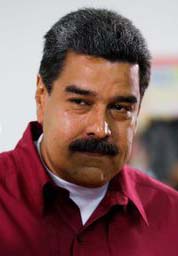CARACAS/WASHINGTON, (Reuters) – Critics at home and abroad yesterday denounced the re-election of Venezuela’s socialist President Nicolas Maduro as a farce cementing autocracy, while the U.S. government imposed new sanctions on the crisis-stricken oil-producing country.
Maduro, the 55-year-old successor to late leftist leader Hugo Chavez, hailed his win in Sunday’s election as a victory against “imperialism.” But his main challengers alleged irregularities and refused to recognize the result.
In response to the vote, U.S. President Donald Trump issued an executive order restricting Venezuela’s ability to liquidate state assets and debt in the United States, the latest in a series of sanctions that seeks to choke off financing for the already cash-strapped government.
Venezuela’s mainstream opposition had boycotted the election, given that two of its most popular leaders were barred, authorities had banned several political parties, and the election board is run by Maduro loyalists.
Maduro won 68 percent of votes – more than three times as many as his main rival Henri Falcon. Turnout was a low 46 percent, significantly down from 80 percent in 2013’s presidential vote.
“The revolution is here to stay!” Maduro told cheering supporters outside the presidential palace in Caracas. He has not outlined firm policies, but has promised to prioritize economic recovery after five years of crippling recession that has seen many struggle with chronic shortages of food, medicines and other basic necessities.
Maduro’s dwindling but often still fervent supporters, many of whom remember the generous welfare policies of the Chavez years, want to give him another shot.
“We believe in the process and we’re giving President Maduro another chance,” said 45-year-old social security worker Maira Garcia, as she celebrated his victory in the poor Caracas hillside neighborhood of 23 de Enero.
U.S. Vice President Mike Pence called the election “a sham – neither free nor fair.”
In a statement sent from the White House, U.S. President Donald Trump called for Maduro to “restore democracy, hold free and fair elections, release all political prisoners immediately and unconditionally, and end the repression and economic deprivation of the Venezuelan people.”
In recent months, Washington has imposed a series of sanctions on companies and individuals with ties to the Maduro government.
Trump’s order yesterday prohibits involvement in the purchase of any debt owed to the Venezuelan government, including accounts receivable, particularly related to oil sold by the OPEC member.
The action appears to target in part Venezuelan-owned but U.S.-based oil refiner Citgo.
“Today’s executive order closes another avenue for corruption that we have observed being used: it denies corrupt Venezuelan officials the ability to improperly value and sell off public assets in return for kickbacks,” a senior administration official told reporters in Washington.
Venezuela’s foreign minister, Jorge Arreaza, called the new sanctions illegal, saying they were “madness, barbaric and in absolute contradiction to international law.”
While the order applies only to U.S. citizens and residents, the official said the Trump administration had had “fairly pointed discussions” with China and Russia over the issuing of new credit to Venezuela. Maduro has counted on the support of China and Russia, which have provided billions of dollars in funding in recent years.
“What these sanctions are seeking to avoid is that countries outside the Western hemisphere come rescue Maduro financially so that he can consolidate an autocracy,” said Venezuelan opposition lawmaker and economist Angel Alvarado.
Other countries also hinted at sanctions, with Spain leading European Union criticism of the election.
And the 14-nation “Lima Group” of countries in the Americas, from Canada to Brazil, said in a stinging statement it did not recognize the vote and would downgrade diplomatic relations. The group deplored Venezuela’s “grave humanitarian situation.”
In contrast, Venezuela’s regional leftist allies, such as Cuba and Bolivia, sent congratulations.
In Beijing, foreign ministry spokesman Lu Kang said China believed Venezuela could handle its own affairs and the choice of the people should be respected.
The Venezuelan government used ample state resources to get voters out on Sunday and public workers were pressured to vote.
Falcon called for a new election, complaining about the government placing of nearly 13,000 pro-government stands offering ‘prizes’ close to polling stations nationwide.
The main political opposition said its boycott had worked, but the disparate group did not appear to have a plan going forward other than calling for new elections – a non-starter given the pro-Maduro electoral council.
Major protests, like those seen last year and in 2014, seem unlikely, given widespread disillusionment and fatigue.
Demonstrators did barricade some streets in the southern city of Puerto Ordaz, drawing teargas from the National Guard, witnesses said.
Maduro, a former bus driver whose second term in office starts in January, faces a colossal task turning around Venezuela’s moribund economy. The bolivar currency is down well over 99 percent over the past year and annual inflation is at nearly 14,000 percent, according to the opposition-led National Assembly.
Venezuela’s multiple creditors are considering accelerating claims on unpaid foreign debt, while oil major ConocoPhillips has been taking aggressive action in recent weeks against PDVSA, part of a claim for compensation over a 2007 nationalization of its assets in Venezuela.
U.S. crude hit its highest level since 2014 on Monday amid rising concerns that Venezuela’s oil output could fall further following the election and sanctions.
Trading of Venezuelan government and PDVSA debt was mixed but volumes remained thin in New York on Monday afternoon, with election results considered a formality and offering little to change investor viewpoints.
The benchmark government bond due 2027 was bid up 0.25 points to 29 cents on the dollar while the benchmark PDVSA 2022 recovered about half of its early losses to trade down 0.65 points in price to 26.851 cents on the dollar , according to Thomson Reuters data.





